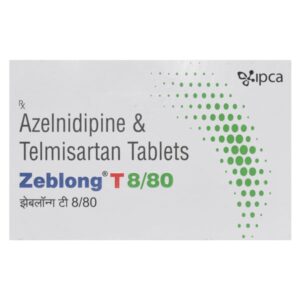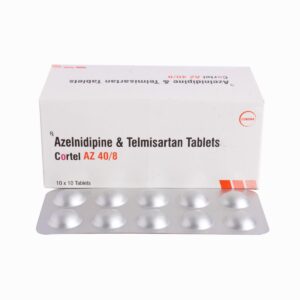TELMISARTAN + AZELNIDIPINE
Telmisartan: Telmisartan is a medication commonly used to treat high blood pressure. It belongs to a class of drugs called angiotensin II receptor blockers (ARBs).
The main mechanism of action of Telmisartan is blocking the action of angiotensin II, a hormone that causes blood vessels to narrow, leading to increased blood pressure. By inhibiting angiotensin II, Telmisartan helps relax the blood vessels, promoting better blood flow and reducing blood pressure.
The usual recommended starting dose of Telmisartan for adults with hypertension is 40 mg once daily. However, the dosage may vary depending on individual needs and the response to treatment. It can be taken with or without food.
Common side effects of Telmisartan include dizziness, headache, fatigue, and stomach pain. Less frequently, it may cause muscle pain, back pain, diarrhea, and upper respiratory infections. Serious side effects are rare but can include allergic reactions, liver problems, and low blood pressure.
It is important to note that Telmisartan should not be used during pregnancy as it can be harmful to the unborn baby. It is also not recommended for people with severe liver disease or those who have a history of allergic reactions to ARBs.
It is best to consult with a healthcare professional before starting Telmisartan or any other medication, as they can provide personalized dosage instructions and monitor for potential drug interactions or contraindications.
Azelnidipine: Azelnidipine is a calcium channel blocker medication that is used to treat high blood pressure.
Mechanism of action: Azelnidipine works by blocking the calcium channels in the smooth muscles of blood vessels, which leads to the relaxation and dilation of these vessels. This results in a reduction of blood pressure and improved blood flow to the heart and other organs.
Dose: The recommended starting dose of Azelnidipine is usually 8 mg once daily, and it can be increased to a maximum dose of 16 mg once daily if needed. The medication should be taken with food to enhance its absorption and reduce the risk of side effects.
Side effects: Common side effects of Azelnidipine include edema (swelling), headache, flushing, dizziness, and fatigue. These side effects are usually mild and temporary. Some individuals may also experience gastrointestinal symptoms such as nausea, abdominal pain, or diarrhea. In rare cases, more serious side effects like allergic reactions, chest pain, or irregular heartbeat may occur, and immediate medical attention should be sought if these occur.
It is important to note that Azelnidipine may interact with other medications, so it is essential to inform your healthcare provider about all the medications you are taking, including over-the-counter drugs, herbal supplements, and vitamins. Additionally, this medication should not be used during pregnancy or while breastfeeding, unless specifically prescribed by a healthcare professional.


